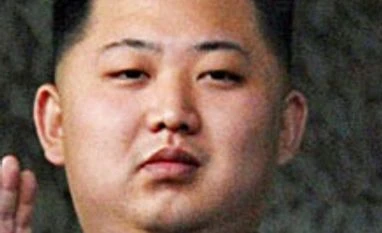North Korean leader Kim Jong-Un today ordered preparations for strategic rocket strikes on the US mainland and military bases in the Pacific and South Korea.
The order, issued at an overnight emergency meeting with top army commanders, was a direct response to the use of nuclear-capable US B-2 stealth bombers in ongoing US joint military drills with South Korea, Kim said.
In the event of any "reckless" US provocation, North Korean forces should "mercilessly strike the US mainland... military bases in the Pacific, including Hawaii and Guam, and those in South Korea," he was quoted as saying by the official Korean Central News Agency.
Kim argued that the stealth bomber flights went beyond a simple demonstration of force and amounted to a US "ultimatum that they will ignite a nuclear war at any cost".
Present at the emergency meeting, held at 00:30 am (1530 GMT yesterday) were the Korean People's Army (KPA) chief of general staff, director of operations and commander of strategic rocket operations.
The United States rarely acknowledges B-2 flights to the Korean peninsula, which remains technically at war. B-2 jets, which dodge anti-aircraft defences, bombed targets in conflicts in Serbia, Afghanistan, Iraq and Libya.
The flight came as part of annual drills between the United States and South Korea, which North Korea each year denounces as rehearsals for war.
Pyongyang has been particularly vocal this time, angered by UN sanctions imposed after its long-range rocket launch in December and the third nuclear test it carried out last month.
The KPA had already put its strategic units at combat-ready status on Tuesday, and the following day it cut the last remaining military hotline with South Korea.
The bulk of the threats emanating from Pyongyang have been dismissed as bluster, and North Korea has no proven missile capability to strike the US mainland -- or indeed Guam or Hawaii.
But Washington has opted to match the threats with its own muscle-flexing.
"We will be prepared -- we have to be prepared -- to deal with any eventuality," Defense Secretary Chuck Hagel told reporters at the Pentagon.
"We must make clear that these provocations by the North are taken by us very seriously and we'll respond to that," Hagel said, defending the B-2 deployment.
The order, issued at an overnight emergency meeting with top army commanders, was a direct response to the use of nuclear-capable US B-2 stealth bombers in ongoing US joint military drills with South Korea, Kim said.
In the event of any "reckless" US provocation, North Korean forces should "mercilessly strike the US mainland... military bases in the Pacific, including Hawaii and Guam, and those in South Korea," he was quoted as saying by the official Korean Central News Agency.
More From This Section
With tensions soaring on the Korean peninsula, two B-2s flew training bombing runs over South Korea Thursday to underline US commitment to its military alliance with Seoul in the event of any aggression from the North.
Kim argued that the stealth bomber flights went beyond a simple demonstration of force and amounted to a US "ultimatum that they will ignite a nuclear war at any cost".
Present at the emergency meeting, held at 00:30 am (1530 GMT yesterday) were the Korean People's Army (KPA) chief of general staff, director of operations and commander of strategic rocket operations.
The United States rarely acknowledges B-2 flights to the Korean peninsula, which remains technically at war. B-2 jets, which dodge anti-aircraft defences, bombed targets in conflicts in Serbia, Afghanistan, Iraq and Libya.
The flight came as part of annual drills between the United States and South Korea, which North Korea each year denounces as rehearsals for war.
Pyongyang has been particularly vocal this time, angered by UN sanctions imposed after its long-range rocket launch in December and the third nuclear test it carried out last month.
The KPA had already put its strategic units at combat-ready status on Tuesday, and the following day it cut the last remaining military hotline with South Korea.
The bulk of the threats emanating from Pyongyang have been dismissed as bluster, and North Korea has no proven missile capability to strike the US mainland -- or indeed Guam or Hawaii.
But Washington has opted to match the threats with its own muscle-flexing.
"We will be prepared -- we have to be prepared -- to deal with any eventuality," Defense Secretary Chuck Hagel told reporters at the Pentagon.
"We must make clear that these provocations by the North are taken by us very seriously and we'll respond to that," Hagel said, defending the B-2 deployment.
)